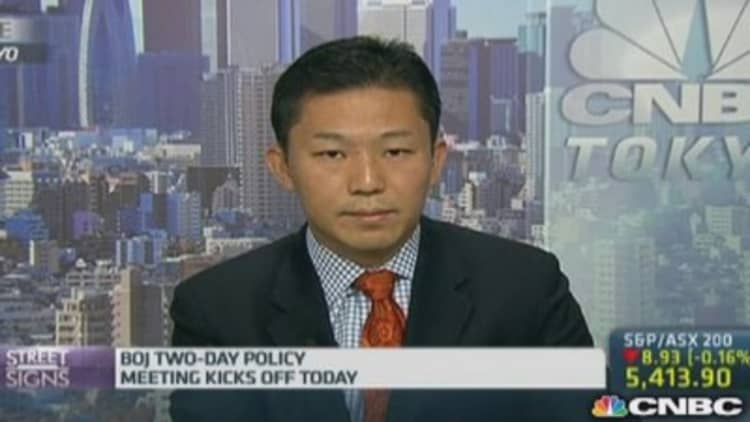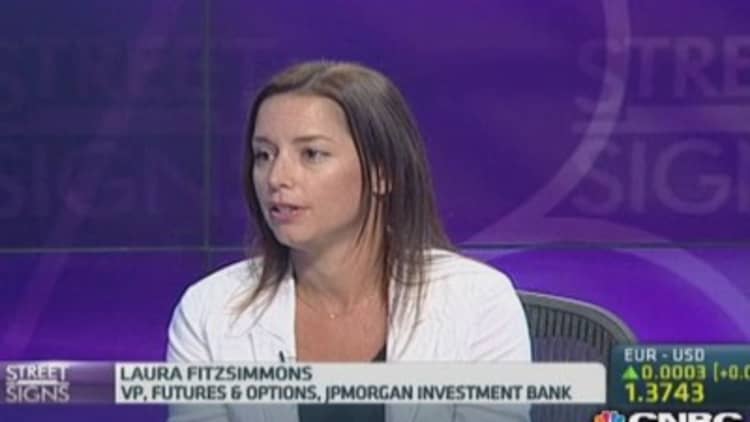
Japan's consumption tax hike is likely to dent economic growth this quarter and some analysts believe it may shock the country into a recession and possibly even a fiscal crisis.
"It is definitely a severe negative shock for Japan's economy," Takuji Okubo, chief economist at Japan Macro Advisors, told CNBC Monday.
He expects the economy will contract 3 percent in the April-to-June quarter from the previous quarter, with the consumption tax hike to 8 percent from 5 percent, effective April 1, possibly pushing inflation for the month to nearly 4 percent.
Read MoreBank of Japan holds off on more stimulus, as expected
In response to the slowdown, Okubo expects the Bank of Japan (BOJ) will apply "multi-dimensional" easing, buying equity exchange traded funds (ETFs) and Japanese government bonds (JGBs) to flatten the yield curve.
"The BOJ will try everything they can," he said, but noted he doesn't expect the moves will be effective.
"When people see the BOJ has tried everything they can and they just cannot do anything more to salvage this economy, that's when the JGB yield will pop," he said.
How deep the coming recession will be will depend on whether a two-decade-long bubble in JGBs collapses, he said.
Read MoreJapan will have a bond default: Fund manager
So far, the BOJ hasn't reacted, announcing Tuesday that it voted unanimously at the end of its two-day meeting to maintain its current policy, as was widely expected. Analysts have noted that the recent rhetoric from BOJ governor Harihiko Kuroda has been fairly upbeat, suggesting further easing may happen later, rather than sooner.
After the meeting, Kuroda said a positive economic cycle is in the works, driven by robust domestic demand.
To be sure, one of the reasons for raising the consumption tax has been to assure creditors that Japan is taking steps toward making its hefty debt pile – one of the highest in the industrialized world – more sustainable.
Predictions of a collapse in Japan's debt markets are also far from new, with shorting the bonds called a "widow-maker" trade for a decade as low interest rates kept prices from falling.
Read MoreJapan's sales tax hike: What you need to know
In addition, while many economists expect the tax hike will cause a slowdown, few expect a full-blown recession.

"Obviously what we have to worry about is the impact on consumers in Japan," said Laura Fitzsimmons, vice president for futures and options at JPMorgan. "What we need to see is how the economy fares over the next few months," she told CNBC.
But she noted there are still a lot of question marks over the longer-term outlook for JGBs.
"If you ask anyone in terms of what's going to be the case in the next five years for Japan -- where are we going to be at? What will inflation be? What will ten-year yields look like? -- I think a lot of people, even strategists, are finding that question very hard to answer. I'm not sure the Bank of Japan can really do a great job of that themselves at the moment," she said.
Read MoreIs the BOJ at its limits?
Not everyone expects the tax hike will seriously derail consumer sentiment.
"Historically, Japanese have been great savers," said Peter Boardman, managing director at Tradewinds. "But at the same time you do have a huge group of younger Japanese who want to spend and they want to buy a house, they want to buy apartments, they want to buy a new car. And that's where you're going to start seeing the economy picking up. "
In addition, it's not clear whether concerns over a potential fiscal crisis would necessarily change any market bets. Okubo expects the yen will fall to around 110 by year end either way.
"If the only way the Japanese economy is to keep growing is by monetary easing, that means yen depreciation," Okubo said.
"If that happens to fail, that means Japan will be in much bigger trouble. That should also mean weaker value for the Japanese market as a whole. I think betting on a weak yen -- it's difficult to make a mistake."
—By CNBC.Com's Leslie Shaffer; Follow her on Twitter @LeslieShaffer1

